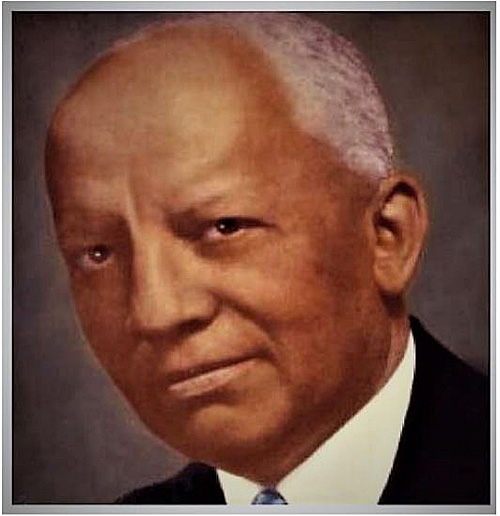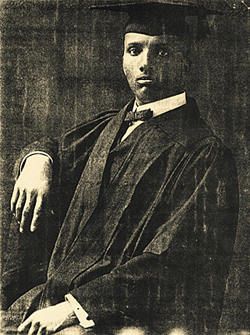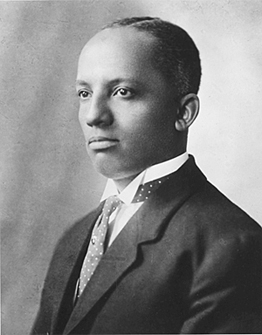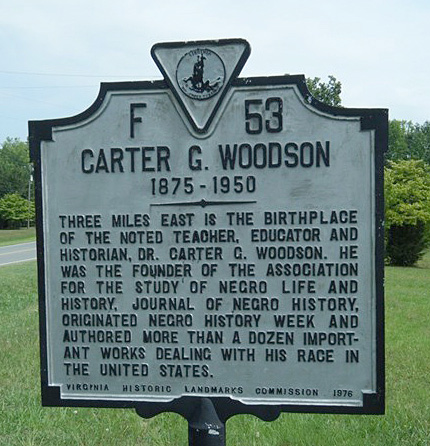

  |
|

|
Name: Carter G. Woodson Date: ca. 1940 Image Number: Berea College Comments: Carter G. Woodson was born in New Canton, Buckingham County, Virginia, in 1875, the son of Anne Eliza Riddle and James Henry Woodson. Carter's father was a sharecropper, who had been enslaved until he joined the Union Army. His mother learned to read and write--his father never did--but both parents encouraged their children to attend the local school run by his mother's brother, James B. Riddle. It operated only five months a year. Even so Carter could not always attend as he was helping his parents on the farm. There was no high school for Black children in Buckingham, and so, when he reached high school age, Carter moved to Huntington, West Virginia, where he worked in the coal mines to save enough money to attend the prestigious Frederick Douglass High School. From there, in 1903, he went on to Berea College, then to the University of Chicago, earning a PhD. from Harvard University in 1912, only the second Black student (after W. E. B. Du Bois) to do so. Carter held various jobs in education, including a stint as a school supervisor in the Philippines from 1903-1907. Carter was briefly Dean of the College of Arts and Sciences at Howard University, though he soon ran afoul of J. Stanley Durkee, its (last) White president, and left after one year. Howard still claims Carter on its webpage 
 (L to R): Carter G. Woodson graduated from Berea College in 1903; Berea College, Berea, KY;
Fed up with academia, Woodson devoted his career to research in the field of Black history, writing books
on Black churches, Black slaveowners before the Civil War, and The Negro in our History, a widely used textbook in Black schools.
He felt strongly that Black people should be proud of their history, saying, "To handicap a student by teaching him that his black face is a curse
and that his struggle to change his condition is hopeless is the worst sort of lynchging." Woodson founded the association for the Study of
African-American Life and History in 1915, and the Journal of Negro History in 1916. In 1926, he started the celebration of Negro History
Week in February, around the birthdays of Abraham Lincoln and Frederick Douglass. This week expanded to a month, now Black History Month.
The center for the study of African American history at the University of Virginoia is named for Carter G. Woodson as well as an African-American history museum in
St. Petersburg, Florida.Dr. Carter G. Woodson earned his PhD from Harvard in 1912; West Virginia State Archives.  Virginia Historical Marker for Carter G. Woodson, 1875-1960 Virginia Historial Marker, Highway Marker F-53 located 3 miles east of New Canton, VA, on James Madison Highway With his family just across the James River, we can imagine Carter Woodson crossing into Scottsville on his way to the greater world, first by the ferry, then after 1907 by the bridge. Copyright © 2021 by Scottsville Museum Top Image of Dr. Carter G. Woodson is courtesy of Berea College, Berea, Kentucky; See: https://www.berea.edu/cgwc/carter-g-woodson-biography Second Image of Carter G. Woodson graduated from Berea College in 1903; courtesy of Berea College, Berea, Kentucky Third Image of Dr. Carter G. Woodson having earned his PhD from Harvard in 1912; courtesy of West Virginia State Archives. Fourth Image of the Virginia Historical Marker (Highway Marker F-53) for Carter G. Woodson, 1875-1950, located 3 miles east of New Canton, VA, on James Madison Highway. |
|
|
|
Museum
Archive
Business
Cemeteries
Church
Events
Floods
For Kids
Homes
Portraits
Postcards
School
Transportation
Civil War WWII Esmont Search Policy |
||||
|
Scottsville Museum · 290 Main Street · Scottsville, Virginia 24590 · 434-286-2247 www.avenue.org/smuseum · info@scottsvillemuseum.com Copyright © 2021 by Scottsville Museum |
||||